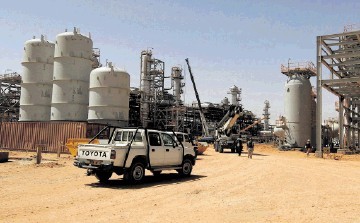
Algeria has held a ceremony marking the 10th anniversary of the In Amenas attack, in which 40 workers were killed.
Around 32 Islamist militants attacked the site on January 16, 2013, taking a number of workers hostage. On January 17, the Algerian military counterattacked, with a helicopter gunship firing into the living areas and then ambushing a convoy attempting to escape.
An explosion took place on January 18 as the forces clashed in the production area. It was all over by January 19.
Algerian Minister of Energy and Mines Mohamed Arkab and Minister of National Defence Saïd Chanegriha attended the ceremony. Sonatrach chairman and CEO Toufik Hakkar was also present.
The two ministers laid a wreath at the Tiguentourine memorial and held a minute of silence. Attendees went on to plant trees in memory of those who died.
At the time of the attack, Sonatrach had a 51% stake, while BP and Statoil shared the outstanding equity. BP struck a deal to sell its Algerian assets to Eni in 2022. There were around 800 workers on site at the time of the attack, of whom around 130 were expatriates.
Heroism and terrorism
The officials also paid their respects to the family of Mohamed Lamine Lahmar, the only Sonatrach employee to die in the attack.
Arkab, in a speech, said the country was indebted to those foreign and Algerian workers who had died in the attack.
Without the workers’ efforts in 2013, the terrorists would have been able to cause much more damage. The workers did “everything they could”, Arkab said, to thwart the terrorists and then restart operations as soon as possible once it was safe.
He also gave thanks for the People’s National Army for its role in the counter attack. The army, he said, continued to play a critical role in Algeria, preserving unity and independence, while also defending the country’s sovereignty. Algeria has taken steps since 2013 to improve security provision and co-ordination.
The attack began on January 16, early in the morning, when a convoy leaving the facility was ambushed. A firefight ensured, leading to the death of security guard Lahmar, who is said to have sounded the site-wide alarm.
A coroner’s inquest in 2013, on seven of the workers, found they had been unlawfully killed. Those killed include four BP workers, five Statoil workers and 17 JGC Corp. workers.
Security failings
A report from Statoil – now Equinor – in 2016 found the Algerian military had failed to detect or prevent the attackers from reaching the site. The security measures at the site itself had not been designed to withstand such a scale of attack and also failed.
The Norwegian report identified a number of additional failings. These included a difficulty in getting partners at In Amenas to agree to act on decisions. Sonatrach opted to take over control of security in 2012. This seemed to create two parallel organisations that often failed to communicate.
It also found problems between local communities and Sonatrach workers from the country’s north, with strikes and threats to expatriate workers feeding into a lack of resilience.
Statoil also said it was “likely” that the terrorists had some amount of inside knowledge. This involved knowledge of the site and the names of senior managers.
One terrorist is reported to have complained that the plan did not match the layout. Algeria has said a former driver at In Amenas was among the terrorists.
